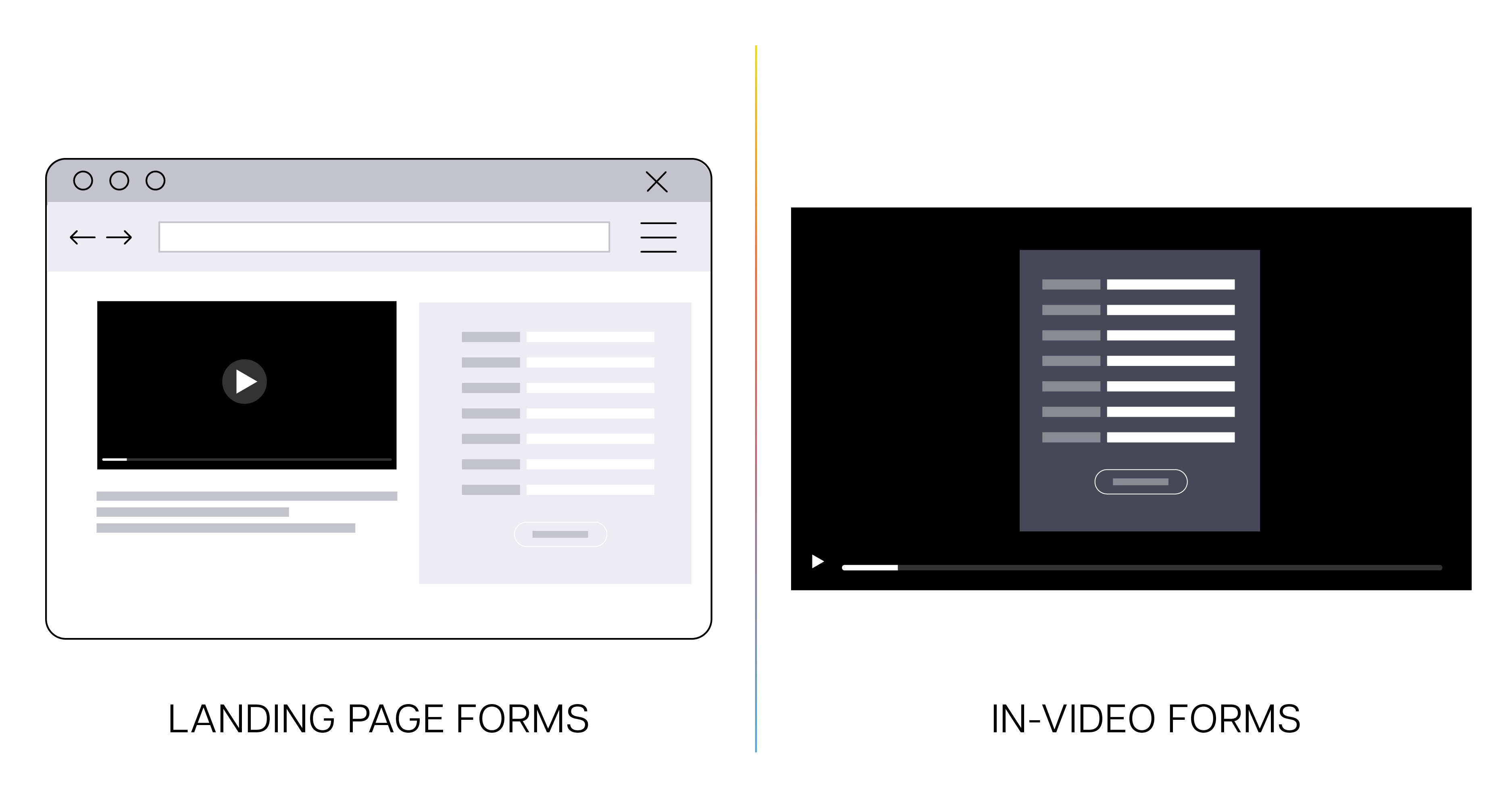マーケティング・ファネルやフライホイールの好みにかかわらず、買い手がたどる旅には一種のものがあることは誰もが認めるところだ。その旅のどこかで、買い手は私たちが知らない人から知っている人へと変化する。それをリードジェネレーションと呼ぼう。
リードジェネレーションに動画を使うことは、特に目新しいことではない。結局のところ、ウェビナーはライブとオンデマンドの特徴を持つコンテンツ・マーケティングの一形態です。しかし、動画マーケティング技術の進歩により、マーケティング担当者が管理しやすくなり、消費者が消費しやすくなりました。結局のところ、リードジェネレーションは、体験から摩擦を取り除くことができたときに成功するのです。
より多くの動画でバイヤーを惹きつけたい、あるいは既存の動画エンゲージメントを活用してリードを獲得したいとお考えなら、うってつけの場所です。
| 目次 | ||
| ビデオ・リード・ジェネレーションとは何か? | ||
| 動画でリードを獲得する方法 | ||
| 動画でリードをクオリファイする方法 | ||
| ビデオ・リード・ジェネレーションのベスト・プラクティス | ||
ビデオ・リード・ジェネレーションとは何か?
リードジェネレーションは、ウェブフォームやチャットボットなどのコールトゥアクション(CTA)を通じて、多くの場合、コンバージョンを促すオーディエンスを構築するためのマーケティング戦略です。動画は他のコンテンツと同様に連絡先情報を収集するための単なる手段ですが、CTA、キャプチャデバイス、チャネルは動画戦略に大きく影響します。
動画でリードを生み出す方法
シーティーエーエス
CTAまたはリードマグネットは、リードを促進するための出発点です。適切なものを選択することは、動画のリードジェネレーション戦略を左右しますが、優れたCTAに共通する重要な属性は、一貫した価値です。
一貫した価値とは、割引のような実際の価値や、独占コンテンツのような知覚される価値を意味する。重要なのは、価格変更を割引として宣伝したり、公開コンテンツを独占的なものとして宣伝したりせず、一貫性がなければならないということだ。そして、ターゲットオーディエンスにとって価値のあるものでなければならず、彼らの意図のレベルやブランドとの関係性に基づいたものでなければならない。
ブランドやオーディエンスはそれぞれ異なるため、適切なCTAは何でもあり得る。しかし、ほとんどのビジネスに当てはまるいくつかのカテゴリーがあります。
- オファー。セールや値引きは、すぐにコンバージョンにつながるため、最も一般的な戦術のひとつである。しかし、限定品やコレクターズアイテムから、カンファレンスや見本市で抽選される有名ブランドのアパレルや電子機器に至るまで、景品も広く使われている。その他の例としては、無料トライアル、ウェイティングリスト、新製品や新サービスへの早期アクセスなどがある。
- イベント。対面式のカンファレンスにしろ、バーチャルなウェビナーにしろ、イベントは多くのマーケティング戦略において長らく定番となっている。
- リサーチ業界研究は、多くの企業にとって貴重なツールです。アナリストからライセンス供与を受けたり、調査や研究を依頼したり、独自のデータを使ってレポートを作成したりすることができます。
- 購読。ブログやその他の定期的なコンテンツを購読することで、ユーザーはより簡単にコンテンツを利用することができます。コンテンツは独占的である必要はなく、バイヤーがメールマガジンを開くのに十分な関連性があればよいのです。定期的に新鮮なコンテンツを制作する専門チームを持つようにしましょう。そうでなければ、このCTAは多くのリードを生み出すことはできません。
- コンタクト・セールス・フォーム。バイヤーの中には、あなたのリニア・ジャーニーをたどるよりも、あなたについて自分で調べる人の方が多いのです。彼らが話をする準備ができたら、コンタクトフォームが彼らを待っているはずです。彼らは、他のリードよりもバイヤージャーニーに沿っているはずですが、それでも、あなたがマーケティングリソースを通じて生み出したリードであることに変わりはありません。
これらのCTAはどれも動画と一緒に使うことができるが、どのCTAをどの動画に使うかは、キャプチャーデバイスとプロモーションチャンネルの両方に依存する。
キャプチャデバイス
デジタル名捕捉は、チャットボットや、ウェブサイト訪問者識別(企業や個人へのトラフィックを解決するために第三者のデータを使用する)と呼ばれるものによって行うことができます。しかし、動画マーケティングのリードジェネレーションには、ウェブフォームが最良の仕組みであることに変わりはありません。以前は一つの方法しかありませんでしたが、インタラクティブ動画が成長するにつれて、リードフォームを表示するための柔軟性も増しています。
- ランディングページのフォーム。試行錯誤の末にたどり着いた方法は、ランディングページの名前獲得フォームの横に動画を埋め込むことです。しかし、ランディングページに動画を追加することの欠点は、動画とフォームの間でクリックが分断され、クリック数が減少する可能性があることです。減少を抑えるには、ページのコピーの大部分を占めることができる動画を使用し、プレーヤーとフォームがフォールドの上にあるようにします。
- ビデオ内のフォーム。 インタラクティブ機能により、リードフォームは個々の動画にオーバーレイとして埋め込まれます。これは、視聴者が視聴体験を離れる必要のないEメール登録フォームを追加できることを意味します。インタラクティブ機能を持つほとんどのオンライン動画プラットフォーム(OVP)は、マーケティングオートメーションプラットフォーム(MAP)と統合し、フォームをインポートすることもできます。例えば ブライトコーブは、ほとんどの一般的な CRM や MAP と統合できます。 Hubspot、Eloqua、Marketo、Salesforceなど。

チャンネル
動画マーケティングは、リードジェネレーションのためにほとんどのデジタルチャンネルを活用することができる。チャンネルによっては特定の種類の動画がより効果的ですが、CTAがメディアに合っている限り、ほとんどのチャンネルはコンテンツを変えることができます。
- ディスプレイ。デジタル広告は多くのリードジェンキャンペーンの要であるため、プレミアム、オファー、イベント、リサーチなどのセルフセリングCTAに焦点を当てるのがベストだ。クリエイティブは、動画広告でも、動画ランディングページにつながる静的広告でもよい。重要なのは、体験をクリーンに保つことだ。例えば、動画広告を使用する場合、同じ動画をランディングページに埋め込む必要はありません。
- Eメール個人情報保護法やサービスプロバイダのポリシーにより、コールドメールの配信はますます難しくなっていますが、Eメールスポンサーシップは独自のリスト構築を始めるのに最適な方法です。スポンサーメールは、基本的に他社のニュースレターに掲載されるディスプレイ広告なので、同じ原則に従います。しかし、専用メールはよりネイティブ広告に近いものです。例えば、より多くのコンテンツを購読するためのCTA付きの限定的なビデオメールを送ることができます。いずれにせよ、動画を添付したり埋め込んだりすることは、送信者の評判を落とすことになりかねません。
- オーガニック検索。大きな動画ライブラリを持つブランドにとって、検索用にコンテンツを最適化することは非常に重要です。動画サイトマップを作成し、スキーマ マークアップを組み込んでいれば、トップ動画にニュースレターの購読を追加できます。サイトマップとスキーマについてよくわからない場合は、Brightcove Galleryに管理を任せることもできます。
- 有料検索。広告とコンテンツマーケティングが一体となった検索連動型広告は、あらゆることに対応できる。動画のランディングページに誘導するテキスト広告で新しい研究を宣伝することができる。あるいは、トレンドのソートリーダーシップ動画を動画広告として使うこともできる。
- ソーシャルメディア。検索エンジンと同様、ソーシャルメディアプラットフォームは非常に多機能である。有料のソーシャル動画広告は、プレミアムやディスカウントを宣伝することができ、オーガニックなソーシャル動画は、ニュースレターの購読を促進するための説明をサポートすることができる。後者については、ソーシャルユーザーはプラットフォーム内に留まることを好むことを覚えておいてほしい。コンテンツに十分な価値があれば、ソーシャルファンをメール購読者に変えることができるかもしれない。しかし、「いいね!」やシェア数には気を配りましょう。一握りのファンを変えるだけで、エンゲージメントが低下するのであれば、その価値はないかもしれません。
もちろん、すべてのオーディエンスが同じように反応するわけではないので、何が効果的かをテストしてください。ランディングページで見逃したものをもう一度見ることができれば、ユーザーが動画広告からコンバージョンする可能性が高くなることがわかるかもしれません。同様に、動画内のフォームで視聴体験を中断することを全く望まず、ページ上の別の場所を好むユーザーもいるかもしれません。
コンテンツ
リードジェネレーションに最適な動画の種類を見る前に、異なるチャネルでどのCTAを使用しているか、またその理由を振り返ってみましょう。
ディスプレイ広告でブログ購読を促進しますか?おそらくしないでしょう。ディスプレイは大量で低インテントのチャネルです。広範な関心を集めるには最適ですが、そのためには通常、オファーのような、知覚的価値よりも実際の価値が高いCTAを使用します。
Googleにランクインするために、ランディングページをバンパーステッカーのプレミアムに最適化していますか?そうでないことを祈ります。ディスプレイと比較して、検索はボリュームが少なく、インテントが高いチャネルである。そのため、本当にターゲットを絞った興味を引くことができる一方で、購読のようなコンテンツを消費するユーザーの意図にマッチしたCTAを持つリッチなコンテンツが必要となる。
結局のところ、あなたのブランドにとって最適な動画とは、どんなものであれ、すでに機能しているコンテンツをベースにしたものになる。以下は、ほとんどの企業でうまくいく傾向にある一般的なタイプのほんの一部です。
- 啓発ビデオ。これらは単なる短い動画ではなく、既存のものでも全くない。アウェアネス・ビデオは、CTAを促進するためにデザインされた新しいアセットである。その制作には、必ずしも専用の撮影が必要なわけではない。多くの場合、モーショングラフィックスと既存の映像で十分だ。例えば、ライブイベントのコンテンツをオンデマンドで視聴できるようにするために、基調講演のハイライトや業界の専門家のクリップを使うことができる。ただ、オファーやイベント、リサーチなど、自分自身を売り込むことができるCTAを使う必要があることを覚えておいてほしい。
- ソートリーダーシップと説明者動画ライブラリをお持ちの場合、インタビューやチュートリアル動画、その他の類似コンテンツがすでにある可能性があります。これらのアセットはバイヤージャーニーの早い段階でオーディエンスを惹きつけるので、リードジェネレーションに理想的です。必要なのは、オーバーレイ、ローワーサーズ、スレートなどを使って、CTAを追加することだけです。先ほどの例を見てみよう:1つの動画を無料で公開し、残りの動画を購読するよう促すことで、ゲート式ポータルを宣伝することができます。この場合、購読が最も強力なCTAになりがちですが、問い合わせ販売フォームも、製品指向の説明動画に戦略的に配置することができます。
動画制作は専門的なスキルであるため、リードジェネレーション広告ごとに啓発動画を作成することが高価に聞こえるかもしれませんが、それは多くの場合そうだからです。動画のリードジェネレーションは、単にすべてのフォームに動画を配置したり、すべてのアセットにゲートをかけたりするのではなく、投資なのです。この点では、ディスプレイキャンペーン用に作成するカスタム広告セットと変わりません。
また、精通した読者なら、製品や体験談のビデオが含まれていないことにもお気づきだろう。これは、トップクラスのデモビデオや注目度の高いケーススタディがリードを生み出せないということではありません。しかし、一般的に、この2つのタイプは、ジャーニーの少し先にいるバイヤーを惹きつけ、ほとんどのキャンペーンの目標に対して十分な広範な関心を引き起こさない。
| ソート・リーダーシップ 説明者 |
啓発ビデオ | |
|---|---|---|
| CTA | ||
| オファー | ✓ | |
| イベント | ✓ | |
| リサーチ | ✓ | |
| サブスクリプション | ✓ | |
| お問い合わせフォーム | ✓ | |
| 捕獲メカニズム | ||
| ビデオ内フォーム | ✓ | ✓ |
| ランディングページのフォーム | ✓ | |
| チャンネル | ||
| ディスプレイ | ✓ | |
| 電子メール | ✓ | ✓ |
| オーガニック・サーチ | ✓ | |
| 有料検索 | ✓ | ✓ |
| ソーシャルメディア | ✓ | ✓ |
動画でリードを獲得する方法
エンゲージメントを追跡することは、ブランドが質の高いリードを特定する主な方法の1つであり、通常はEメールの開封率やクリックスルー率などをモニタリングすることで行います。残念ながら、これらの指標ではコンテンツのエンゲージメントは測定できません。平均セッション時間やスクロールの深さのようなウェブオプションは役に立ちますが、よくても不完全であり、最悪の場合、大きく間違って表現されます。
リードジェネレーションのために動画を使用している場合、コンテンツ消費を測定するためのより良い方法があります。しかし、どの動画指標を使うかは、あなたのビジネスモデルによって異なります。
リード・スコアリング
リードスコアリングは複雑なプロセスで、自社のプロパティ全体でユーザーの行動を追跡し、バイヤーペルソナとの整合性に基づいてアクションにポイントを割り当てる。B2Bブランドで採用されることが多いのは、バイヤーが製品を使用する前にその製品に満足しなければならないからです。バイヤーが唯一の意思決定者であることは稀であるため、バイヤーはその製品を非常に気に入り、同僚にその投資を売り込みたいと思う必要がある。したがって、バイヤーはあなたのブランドと深く関わり、彼らのエンゲージメントを追跡し、意図を反映するようにスコアリングする必要があります。
動画エンゲージメントは、消費されたコンテンツの割合であり、リードスコアリングに必要な深いエンゲージメントを追跡するための最良の方法である。
例えば、商品ページでの平均セッション時間が3分ということは、買い手があなたの商品について読んでいて、潜在的に興味を持っているということかもしれません。しかし、それはまた、彼らが欲求不満であり、彼らが本当に探しているものを見つけるためにあなたのメニューを探し回るためにランダムなページで停止したことを意味するかもしれません。逆に、説明ビデオのエンゲージメント率が80%ということは、購入者が意図的にクリックしてコンテンツを再生し、消費したことを意味します。どちらも、コンテンツへのエンゲージメントがより明確であることを示しています。
動画エンゲージメントを使用すると、リードスコアリング・モデルの他の要素と同じように、通常のしきい値を設定することができます。例えば、ある時間枠内で80%以上のエンゲージメントを獲得した動画に対してポイントを設定することができます。さらに重要なことは、これらのしきい値をシーケンスで追跡することです。エンゲージメントの高い無関係な動画を何本も見るバイヤーは、同じトピックの動画を何本も見る別のバイヤーよりも興味がない可能性が高い。
動画エンゲージメントのさらなる利点は、より正確な興味の対象として、より良い情報をもってリードを営業に渡すことができることです。動画がなければ、ページビュー、クリック数、スクロール数(これらはすべて閲覧行動を測定するもの)に基づいて、どの製品を検討しているかを推測しなければならない。しかし、動画があれば、彼らがどのコンテンツを消費したか、ひいてはどの製品に興味を持ったかを明確に把握することができます。この情報によって、営業チームは先手を打つことができ、より適切な質問やリソースを提供することで、パーソナライズされたアウトリーチを行うことができます。
鉛栽培
リード育成は、リードスコアリングよりもはるかにシンプルなプロセスであり、多くの場合、クロスプラットフォームのタッチポイントを追跡するよりも、単一のチャネル内でオーディエンスのエンゲージメントを維持することに重点を置いている。販売サイクルが短い、または価格帯が低いB2Cブランドは、バイヤーが一般的に唯一の意思決定者であるため、この方法を使用します。買う準備ができたら買う。彼らはあなたのブランドに深く関与する必要はなく、定期的に関与し、あなたの製品を常に頭に置いておく必要があるのです。
動画再生率とは、動画が再生された回数の割合のことで、リード育成に必要な定期的なエンゲージメントを追跡するのに最適な方法です。
動画がクリック率を高めることは、マーケティングではよく知られている。この種のブランドは通常、競合が多く、市場の雑音が多いため、目立ってクリックを促進するためにもっと工夫する必要がある。静的な広告や文章によるコンテンツは今でも非常に効果的であり、完全に取って代わられることはないだろう。しかし、動画を使えるところならどこでも、テストしてクリックが増えるかどうか確かめてみよう。
動画再生レートを使用すると、視聴者を惹きつける上で動画が他のタイプのコンテンツと比較してどうなのかをすぐに確認することができます。ただし、自動再生のベストプラクティスがこれにどのように影響するかには注意してください。
例えば、動画とブログのどちらがオーガニックなソーシャル投稿のクリックを促進するかをテストする場合、自動再生をオフにする。ブログのクリックと動画のクリックを比較する必要があり、自動再生は後者を否定することになる。同様に、動画メールをテストしている場合、コピーでユーザーに "今すぐ見る "ように促す必要があるため、自動再生はオンにしておく必要がある。しかし、これでは再生率が100%になってしまうので、代わりにメールのクリックスルー率を比較する必要があります。
また、動画の再生率はチャンネルによって異なり、プラットフォーム間で比較できないことにも注意が必要です。オプトインされたメール購読者は、通常ソーシャルファンよりもはるかに高いレートを持ちます。さらに、リードスコアリングとは異なり、プラットフォーム間でユーザーの行動をそれほど追跡する必要はありません。より多くのタッチポイントを作るよりも、購買者が最も快適な場所でエンゲージし続ける方が効果的なのだ。
ビデオ・リードジェネレーションのベストプラクティス
リードジェネレーションに動画を使うとき、あなたがしていることは、より大きなリードジェネレーション・コンテンツ戦略の一部分に注意を喚起することだけです。つまり、あなたの動画は、このようなシンクピースのアドバイスよりも、リードを生み出すためのあなた自身のベストプラクティスに従っていることの方が重要なのです。しかし、もしあなたが動画を取り入れるのに困っていたり、強化する新しい方法を探しているなら、以下のヒントを試してみてください。
| 動画リードジェンを向上させる5つのヒント | ||
| 1.コンテンツのゲート(一部 | ||
| 2.リードをクオリファイするCTAを選ぶ | ||
| 3.ランディングページのA/Bテスト | ||
| 4.MAPとOVPの統合 | ||
| 5.インタラクティビティでコンテンツをパーソナライズ | ||
ゲーティング・コンテンツは、何十年もの間、B2Bマーケティング戦略として使われてきた。しかし、時間の経過とともに、特にアカウント・ベース・マーケティング(ABM)の実践者の間で、より良いユーザー体験を生み出す方法として、ゲーティング・コンテンツを解除することの人気が高まった。支持者は、ゲーティングを解除することで、特にオーガニックなトラフィックが増加し、信頼性が向上すると主張した。明らかな課題として、これはリードを減少させるだけでなく、これらのブランドが必要とする高度に洗練されたターゲティングに逆行する可能性がある。
たとえばブライトコーブ。私たちはストリーミング・テクノロジーの会社ですから、当然、ストリーミングに関するコンテンツをたくさん作っています。しかし、他の企業はどうでしょうか?Netflix、Amazon、Apple、その他の消費者ブランドです。私たちのコンテンツをすべてアンゲートすれば、確かにトラフィックは増えますが、単にストリーミングサービスを探している消費者に対する私たちのリードを薄めることにもなります。
実は、ゲーティングが機能しなくなったのではなく、特定のアセットが機能しなくなったのだ。コンテンツマーケティングブーム以降、電子書籍やホワイトペーパーのようなものは、飽和のためにその価値を失っただけである。しかし、リサーチのような資産は価値を失っていない。むしろ、バイヤーはそれぞれの分野に関連するデータや分析に飢えている。だから、啓発ビデオを使ってゲート付きPDFを宣伝しようが、ゲート付きウェビナーに調査結果を組み込もうが、このようなコンテンツは依然として有効なのだ。ゲートは残すが、賢く使おう。
2.リードの質を高めるCTASを選ぶ
最良のCTAは、適切なオーディエンスから関心を集める。しばしば、企業は自社のビジネスに関連するリードマグネットを採用するが、それは自社の目標を直接サポートするものではない。
高級靴メーカーが新しいハイキング・ブーツを発売するとしよう。プレミアム製品として市場に参入するのだから、価格ではなく価値を売る必要がある。販売サイクルがやや長くなるため、自社の価値提案について教育できるリードを生み出すためにプレミアムを検討している。
靴会社は、より高価な靴に関心のある顧客をターゲットに、高品質の靴ひもをプレミアムとして使うことができる。しかし、靴紐はビジネスに関連しているとはいえ、他の種類の靴を探しているバイヤーから非常に幅広いリードを生み出すだろう。
新しいハイキングブーツの発売という目標をサポートできるプレミアム商品は、ウールの靴下かもしれない。ウールは日常的な靴下にはあまり使われない素材なので、靴に興味があり、険しい状況でのアウトドアに興味があるバイヤーをターゲットにする可能性が高い。
非常にターゲットを絞ったCTAを選ぶことで、潜在的なリードが登録される前に適格性を確認し、コンバージョン率と顧客生涯価値(CLV)を高めることができます。
3.ランディングページのA/Bテスト
CTA、コンテンツタイプ、キャプチャーメカニズム、チャネルミックス、そしてフォームの配置でさえも、ベストプラクティスというよりは、適切なテストの結果なのです。そして、これはキャンペーンのパフォーマンスを比較するという意味ではなく、ランディングページをA/Bテストするという意味です。
A/Bテストは単一の変数に限定し、1,000を超えるコホートで少なくとも3回繰り返すことで、コントロールされた統計的に有意な結果が得られます。A/Bテストは、設定、実施、分析に時間がかかりますが、最適なコンテンツや最適なCTAを特定するのにこれ以上適したものはありません。
例えば、オーディエンスが説明動画とソートリーダーシップ動画のどちらに興味を示すかを知りたい場合、プロセスは簡単です。ランディングページを(動画を除いて)同じように複製し、ランダムなオーディエンスセグメントを作成し、テストをメールで送信します。その結果、より多くの種類の動画を作成したり、サイトに新しいセクションを追加したり、専用のニュースレターを開発したりすることができます。
同様に、動画ランディングページへの動画広告がCTAを分岐させるかどうかをテストすることもできる。ページ(動画以外)を複製し、セグメントを作成し、メールを送信し、その結果を動画リードジェネレーション戦略に反映させる。
4.地図とOVPを統合する
MAPは、顧客データとマーケティングデータによってオーディエンスをセグメント化する能力で、すでに十分に強力です。MAPをOVPと統合することで、コンテンツデータというもう1つの貴重なソースが解放されます。
動画のコンテンツ・データを使えば、動画の再生率とエンゲージメントによって視聴者セグメントをさらに絞り込むことができます。B2Cは、平均再生率が最も高いコホートで説明シリーズをテストして、知識のギャップを判断し、ドキュメンテーションを導くことができます。また、B2Bでは、動画エンゲージメントが高いコホートでソートリーダーシップ動画をテストして、バイヤーの関心を測定し、製品開発を形作ることができます。
また、MAP統合により、OVPにフォームをインポートできるため、動画体験に条件ロジックを追加することができます。
例えば、価値の高い動画をゲート化し、登録済みの顧客が情報を再入力することなく閲覧できる条件を追加することができる。あるいは、パフォーマンスの高い動画にダイナミック・フォームを使用して、顧客データのギャップを埋めることもできます。標準的なフォームに空のフィールドだけを表示するように設定することで、バイヤーに負担をかけずに貴重なデータを収集することができます。
統合データの可能性は無限ですが、ブライトコーブはこれをさらに一歩進めます。一般的な MAP との統合だけでなく、Blueshift、Braze、Sailthru などの顧客データ プラットフォームとの統合も可能です。Amazon S3 バケットへのデータ エクスポートも可能なため、お好みのシステムで分析できます。
5.双方向性でコンテンツをパーソナライズ
インタラクティブな動画コンテンツは、他のウェブコンテンツと同様に魅力的であり、パーソナライゼーションやリードの認定を行う機会も提供する。
アウェアネス・ビデオの「今すぐ購入」ボタンは、衝動的な購入者がリードナーチャリングを完全にスキップすることを可能にする。評価や絵文字は、説明動画がどれだけ彼らの質問に答えているかを示すことができる。動画間の分岐は、ソートリーダーシップ動画の関連コンテンツに誘導することができます。
インタラクティブ・ビデオは多くのメリットをもたらすが、使用する要素や使用量には注意が必要だ。リードはあくまで潜在的な顧客なので、あまり馴れ馴れしくしすぎると、彼らを怖がらせてしまうことになりかねない。
例えば、サードパーティのデータを使って動画をパーソナライズし、その名前や会社の名前を入れることは、パラノイアを誘発したり、最悪、データが間違っていた場合、見事に裏目に出る可能性がある。同様に、いくつものインタラクションを動画に盛り込みすぎると、最初はエンゲージメントを刺激しても、やがて疲労と無関心を引き起こすかもしれない。
何から始めたらいいのかわからない場合は、今いる場所から始めましょう。結局のところ、動画のリードジェネレーションは、あなたが他のタイプのコンテンツですでに使っているのと同じ原則に従います。ですから、あなた自身のベストプラクティスから構築し、あなたの戦略に合ったヒントをここに取り入れ、必要に応じて改良してください。




